Good actors interpret their characters as written; better actors improve their characters as imagined; but it is the best actors who surprise us, communicating with enough immediacy that their performance lifts the story itself. Central to my love of film is performance, what an actor does onscreen, the big swings and the small gestures, how each choice leads me to wonder what they did offscreen to get there. The actors of early Nollywood were so committed that they felt real, and there were stories of unknowing viewers who thought their performances were who they were. That iteration of the industry may be unfairly maligned in recent years, but it still represents the peak of storytelling and acting talent, even though the absence of coordinated direction meant it was often over the top. Yet the clips and memes reentered pop culture for a reason.
The last fifteen years have allowed us a clearer view of acting craft, and some of the performances that we have come to accept as defining — Ramsey Nouah in The Figurine, Rita Dominic in The Meeting, Sadiq Daba in October 1, Sola Sobowale in King of Boys — espouse a Nigerian brand of realism, indigenous if not always in craft but in spirit, that even the best debut performances of the last five years — Swanky JKA in Living in Bondage: Breaking Free, Nonzo Bassey in La Femme Anjola — find.
2023 was a good year for acting in Nigerian cinema and TV, and some of it came in ensembles, which suggests that the overall creative visions for the stories were key. So in making this list, we tried, where necessary, to acknowledge the writers, directors, or cinematographers who helped create the character. Our criteria: How well-written is the character? Does the actor capture the spirit of the character? Is there something unique they bring? Do they carry the story? Decisively: how might their performance age?
For this list, we only considered films and TV series that were available to us, either on streaming or from screeners. Some were released before 2023 but came on streaming within the year.
Honourable Mentions
I was taken by the young ensemble of Ijogbon — Kayode Ojuolape, Ebiesuwa Oluseyi, Ruby Akubueze, and Fawaz Aina as teenagers endangered by their discovery of diamonds in a sleepy Yoruba town — and it may be unfair to single one out above the rest. In another ensemble film, Jagun Jagun, Lateef Adedimeji plays the warrior ingenue to Femi Adebayo’s warlord, and both are terrific, but it is Adedimeji whose face and body morphs from terror to courage as required. Working as a foil to both of them is Ibrahim Itele Yekini’s general, who, in his shorter screentime, gives a moral width to the story.
A different, modern warlord reigns in Gangs of Lagos: Olarotimi Fakunle’s eleniyan Kazeem, a supporting performance with steam. At the center of the story is a young man whose mother, played by Iyabo Ojo, is morally punishing. The actor playing that young man, Tobi Bakre, delivers showier, charismatic work in another film, Brotherhood, a role that landed him Best Actor prizes from the continent’s two major awards bodies: the Africa Magic Viewers’ Choice Awards (AMVCAs) and the Africa Movie Academy Awards (AMAAs).
Another former Big Brother Naija star Mercy Eke delivers a resourceful turn as a sex worker who loses her life in Shanty Town. That series would not have worked without the naivete of Nancy Isime’s Shalewa, a woman seeking to buy her freedom from sexual slavery: her Shalewa shows us, even before we see him in action, how much of a terror Scar can inflict on his women.
The trauma of women is also the subject of two performances by Funke Akindele, a comedic actor who gets overlooked for her dramatic chops. In the film Battle on Buka Street, she is a daughter, wife, and mother raging against family, and in the TV series She Must Be Obeyed, she is a singer raging against other female singers. In both, she shows hurt well. People get hurt in the whodunit A Weekend to Forget, and its final ten minutes belong to Ini Dima-Okojie.
One of the year’s small but significant work is by Kate Henshaw-Nuttal in The House of Secrets. Her brief appearance brought a familiar candor to a film that is decidedly often Hollywood in its tone. The film is anchored by Najita Dede as an older woman regaining her memory, but its best parts are in the flashbacks, in which Charles Fuqua — who is putting his stamp on intense characters, like he does in The Trade — is a military man in love sworn to do right by his country.
Finally, in two very different films, Richard Mofe-Damijo stretches himself: physically as a hitman seeking revenge for his slain son in the global hit thriller The Black Book, and emotionally as the husband of a mentally struggling wife in the historical drama 4:4:44. His performances hold both films together. But it was his co-star in the latter, Nse Ikpe-Etim, who, limited as she is by the script, landed major recognition with the AMAAs Best Actress prize.
On a different day, I might have ranked the performances below differently, even raised a few that have been honourably mentioned. But what will not change is our Top Four, who each give the best performances of their careers.
10.
Baaj Adebule, The Men’s Club

Adebule’s four-season run on The Men’s Club, as Louis Okafor, the linchpin in a group of four men navigating friendship, romance, and work in Lagos, is so easy on the eye that it seems to be underrated. In Season 4, Louis’ ex-wife Tonye (Segilola Ogidan) works on using his daughter to lure him away from his lover Lola (Nengi Adoki), and, as a man susceptible to being bounced around by the women in his life, Adebule has learned to hold his ground. “Louis, it’s been almost two years, are you still going to divorce me?” Tonye asks. “Yeah,” he says, still playing with their baby, but with weariness on his face. She takes the baby away from him and he stands there, touching his hat of his that he wears even in the house, mutters, “Mehn, this bitch is crazy.” No one should get points for leaning into dimpled charm while playing a lover, but when they do it year after year without cheesiness, when they do it while trying to hold off an overbearing mother’s interference and building responsibility, and keeping a friend unit together, then that homely charisma is worth being noticed for popping out in a group of men where he is not the most natural leader. It is worth noticing even when it comes in a light, comic performance.
9.
Chike, Gangs of Lagos
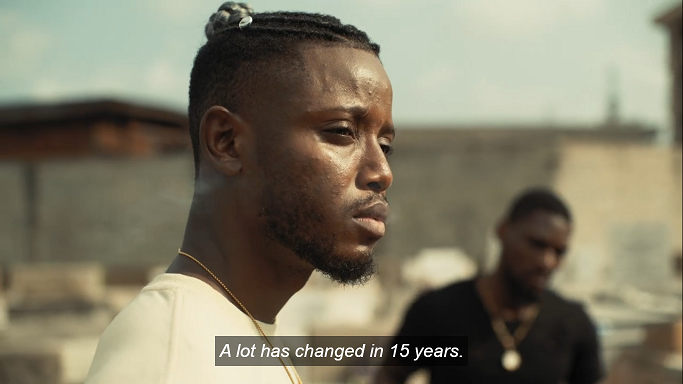
There is now a pattern of talented musicians making strong impressions in their Nollywood debuts. First, there was the rapper Reminisce in 2018’s King of Boys, and then the singer Nonzo Bassey in 2021’s La Femme Anjola. But unlike those star-making turns, what the singer Chike adds to Gangs of Lagos is not guts or gravitas but levity. Ifeanyi, like his actor, is a musician, and his talent is the ray of light in the dark street life of Isale Eko. Tangible talent means realizable dreams, and dreams propel not only their trio of friends but also his mother, who showers him with affection. He is not responsible, the deadbeat father of a child whose young mother he has to be forced to take care of. His tendency to laughter makes him a perfect foil for Tobi Bakre’s brooding Obalola.
Chike lets Ifeanyi have a diffidence necessary to set apart, and when he accompanies the eleniyan to the butchering at the barbershop, we see in his jolted body, his widening eyes, that he knows he doesn’t belong here. What he witnesses is his undoing — and that heartbreaking night scene on the street provides one of the film’s uncontrived emotional points. The first credit for Ifeanyi should go to the writers, yet without the liveliness that Chike gives him, he would be little more than any of the countless Nollywood characters flattened by a lack of imagination. Obalola describes him as “the best of us.” He is the conscience of Gangs of Lagos, our inroad into its world as viewers, and after he is gone, because he is gone, darkness comes.
8.
Tega Ethan, All Na Vibes
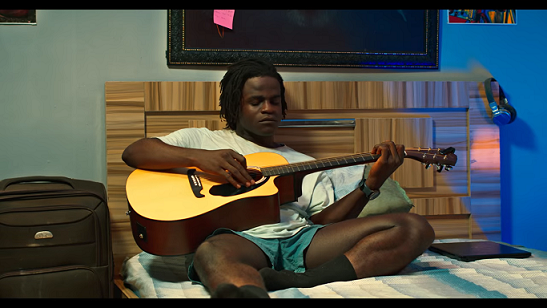
The opening shots of Abiola in his bedroom, playing a guitar, establishes him as a chaser of individual dreams, and not just because he tells us so. In his first interactions, with his mother and later his friend Lamidi (Molawa Davis), he has to be coaxed into doing things, and when he accompanies Lamidi to seek a venue for their party, we understand why. With his dreadlocks and drooped head, a reticent, hands-in-pocket manner that one might call chill, Abiola is a character belonging entirely to a generation of millennial and Gen Z people committed to their own stubborn outlook on the world.
Nigerian universities are on strike yet again and he thinks of going to the Juilliard School to study music instead. He is writing a song that may or may not have been inspired by his crush for a girl in the neighbourhood, and he is so gentle that, even after she is rude to them, he forgives her. He ought not have. But he is a creative and a feeler and people like him believe that all they need to navigate the world are heart and talent, when in reality it is cynicism and tact. Next to the loud Lamidi, Ethan’s naturalistic acting keeps All Na Vibes grounded enough to attain its neorealist ambitions. I am touched by his performance because I have a friend who behaves exactly like him. Ethan, a singer-songwriter, doesn’t always let us see that he is playing a character, which makes it easy to overlook the craft in what he has done.
7.
Chioma Akpotha, Gangs of Lagos

We should have seen a performance like this coming: the burnished love and pure rage of a grieving mother. It felt to me like the industry had been gesturing towards it, with Sola Sobowale in the King of Boys film and series and Funke Akindele in Far from Home, playing characters so different in their values and reactions but united by three-dimensional portraits of motherhood and agency. It makes sense then that the passion and pain of Chioma Akpotha’s performance is wholesome. We meet her as the quintessential doting Igbo mother: spoiling her son with affection and managing her hopes that perhaps his good heart would overcome the darkness of his gangster world. She is playful, trading jokes, and unencumbered.
When the worst happens, her screams come out in bursts, and Akpotha makes her a woman whose body is struggling with the visceral demands of shock. The angry, bereaved mother we see in the next scene, at the pulpit, is drained, like the tears have refused to fall further, but energized. Courtesy of the camera work, her striking monologue seems to ascend to the roof of the church, to the God of grieving mothers. “Look at my pikin, negodu nwam. Dem wan cover the dead body” — she shakes her head, like a Mamie Till-Mobley over Emmett Till’s body — “I tell them no. All of una go use una eyes see wetin dem don do my pikin.” Raging with her stony face and broken heart, it is not just Isale Eko that is roused to action — it is us, sharing that monologue on social media. This is more varied acting than her Africa Movie Academy Award (AMAA) Best Actress winning role in 2007’s Sins of the Flesh, and Ms. Akpotha should clear her mantel for every supporting actress award this season.
5. (TIED)
Mercy Johnson, Battle on Buka Street
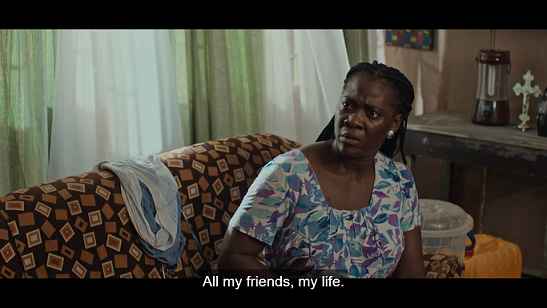
There was a time, little over a decade ago, when Mercy Johnson was widely considered the most versatile actor in Nollywood, and, in Battle on Buka Street, her meld of envy, hurt, and dread reminds us of that. Her Awele is a woman rowing against her own circumstance: a daughter born into a rivalry between her mother and her co-wife, who takes that pettiness to extremes against her half-sister and competing chef Yejide (Funke Akindele). Beaten by her husband (Kelvin Ikeduba) after she finds him cheating, she returns home and is angry that her mother Ezinne (Tina Mba) now wants peace. She has dragged her children back home with her, against their will, and her mother is sick and puzzled by her venom.
The three generations of women clash in a delightful verisimilitude in dialogue. “Mama, please, I am begging you in the name of God,” Awele warns. “This is my battle. Allow me fight it myself. Do not interfere. Please.” She flares up at her daughter: “I will break your head!” Her own mother, angry, shouts the same to her. “You are an idiot,” Awele says to her daughter, and her mother says the same to her. “Sit down!” Ezinne orders Awele. Both women are crying, still hurt from the past.
Awele has pent-up aggression from her marriage that needs an outlet. “Did somebody swap my mother with another mother?” Awele asks later. “No, my mother will teach me how to attack, she will give me weapons to fight my enemies.” Her mother’s reply: “When you grow older, learn to choose your battles.” It takes until one of the last scenes for Awele to finally choose her battle, and when she does, locked in a grip with her sister, Johnson suddenly breaks Awele’s face into vulnerability. It is a face we have seen so many times from Johnson, but this time, at the tail of a richly realized co-leading performance, it comes together.
5. (TIED)
Tobi Bakre, Gangs of Lagos
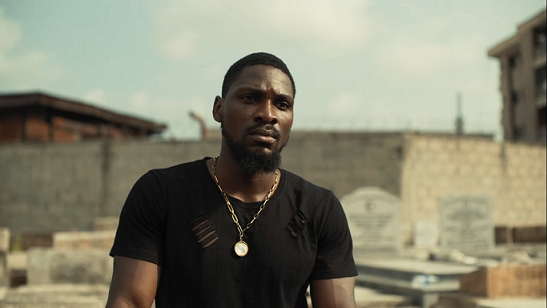
In the world that Obalola grows up in, little matters more than survival. He is a precocious child with a talent for ruthlessness, and the fortune of an adoptive father who gently turns him away from it, and relocates him to his house, from where he can see his crush every day from the window. His dreams grow, as does his bond with his friends, Ifeanyi and Gift. His dreams are stalled when his adoptive father is murdered. When next we see him, he is an adult, pensive but resigned, as Tobi Bakre would have it. He is now the trusted muscle of his new adoptive father Kazeem (Olarotimi Fakunle), the new Eleniyan, but must also look out for Ifeanyi (Chike) and Gift (Adesua Etomi-Wellington), who are also working for the Eleniyan.
The skill of Bakre’s portrayal is in its continuum: keeping him as a young man subdued by life but knowing the worth of his loyalty. Bakre plays him like a glass wall behind which something lurks. That thing could be a dream today and revenge tomorrow, but always a yearning. When he meets his crush, an adult Teni (Bimbo Ademoye), her privilege — sequestered from street life, but not oblivious to her father’s dealings — triggers an outburst at fate. This is a promising young man who dons violence only when he has to — like when he roughhouses Kazeem’s nervous debtor, or when he faces off against another gang. Bakre’s journey from reality TV star to Nollywood’s most exciting new star in years has happened because of a visible commitment to his job: How else is Obalola so different from the sanguine criminal in Brotherhood? He should be the frontrunner for that AMVCA Best Drama Actor 2024 — and, this time, no one may be more deserving.
4.
Nse Ikpe-Etim, Shanty Town

The problem with being one of Nollywood’s handful of truly technically equipped actors is that Nse Ikpe-Etim — a woman who casually pulled off a masculine costume as The Joker — is drawn to taxing roles, which, in an industry with so few of them, means that she must streamline herself to playing women on the edge — women with often-rough exteriors but always cracked, or crackable, on the inside — and the fact that we expect her to play them because she is good at them may be why AMVCAs voters did not reward her career-best turn as Enewan, her most interiorly rich character since Susan Abbah from 2012’s Mr. and Mrs.
Enewan is the resolute head of a prostitution ring in Shanty Town and Ikpe-Etim makes her both fascinating and revolting to watch. Her job is to run the girls for Scar, the man who rules over all their lives, and ensure that they “settle” him with 60% of their earnings. When a vengeful Inem (Ini Edo) returns from jail, we learn that Enewan has taken not only her place in Scar’s establishment but also, unknown to her, his bed. A sisterly, cat-and-mouse dynamic ensues between the two women.
Even as jealousy underpins Enewan’s every move, Ikpe-Etim ensures that her moral code is indecipherable. She wants violence against her competitors but she also wants a limit to punishment. There is a balancing quality to her presence in the community, too, and, after Inem’s battering at the hands of Chief, she quips at Scar, “Na so Chief dey do. Wetin you don do about am?” Ikpe-Etim mostly masks Ene’s real feelings because it is how she, a brutal woman in a world of soulless men, must play to survive.
3.
Kehinde Bankole, Sista

Vicky, Sista: mother, cleaner: a simple woman and believer in honesty: the kind of person that you sort of wish that every other person is — the kind of human being that most people probably even start out as, until something happens to them and, in self defence, they snap into cynicism. Except that Vicky, affectionately called Sista by even her children, is too lofty a human being, too humbled by life and powered by hope, to snap into cynicism. She may be powerless against the world but she is not weak. And the fact that she is believable is down to Kehinde Bankole’s generosity in enriching her with detail.
Sista is told in two timelines, the present and the past, almost two decades apart, and Bankole is the older version. She has raised a boy and a girl singlehandedly, given them a life without suffering. That is, if you discount the emotional burden on her children watching her overwork herself. Sometimes they ask her to not work for the day. She knows she must. “It is you, the two of you, that give me strength,” she tells them. Her children’s constant efforts to correct her into using Good English do not land, though, because Bankole already conveys a totality of personhood that renders null the insinuation that Sista lacks any sense of clear expression that Good English would have given her. “I will work hard,” she says later, “so that my children will not serve like I am serving.” But Sista’s refusal to be cynical does not mean that she will not protect herself and her children from a brutalizing past, which comes in the form of her remarkably selfish ex-boyfriend Fola (Deyemi Okanlawon).
The editing and direction do not always assist Bankole: in one instance, when the story goes from Sista’s past to the present, the camera does not return to Sista’s face, as one might expect after a strong flashback, but to her hirer Jemima (Tope Olowoniyan). We are denied another moment of potential power when, after her heartfelt rage bursts in confession to Jemima and Tiwa (Bisola Aiyeola), the camera doesn’t stay with her and let us digest that outburst — it cuts away to another scene. Thankfully, she is an actress who can keep a faltering final act afloat, and when, finally, she erupts at Fola, one is relieved that the script does not deny her an overdue human reaction. In What Kept Me Up’s annual poll, Nigerian critics voted this the year’s top female performance in a film — rightly. I voted differently only because I had not seen the film then. I now make amends. This may be my favourite performance of the year.
2.
Blossom Chukwujekwu, The Trade

Eric is no ordinary serial kidnapper, and when we meet him in the first scene of The Trade, his stony eyes are those of a man scarcely saddled by his conscience. By carrying out assignments with painstaking detail and organization, he has extorted his way to carefully managed wealth and infamy. He harbours no scruples about the terror he inflicts on his victims and their families, sometimes even taking pride in his work. In one of the few fine details the film indulges, Eric is watching the news of escaped kidnap victims in his living room and smirks. “Umuazi,” he mutters about the kidnappers. Amateurs.
Chukwujekwu allows Eric shades of humanity, not to cast him in a sympathetic light but to reveal him as a man unwittingly shackled by a sense of responsibility. He is a man defined by a deep-seated sense of manhood, equal parts loving Igbo father and menacing crime boss. “Man wey no fit take care of im family, o nwoke di ifa, na man?” he barks at a colleague who is again asking for a loan. A man who cannot take care of his family, is he a man? Although the story does not probe Eric’s patriarchal values, Chukwujekwu takes advantage of every slim opportunity to keep his motivations stitched visibly. Finally on the run from the police, and suspecting that his girlfriend has betrayed him, he chokes her, and, when she confesses, shoves her out of the moving car. Yet he does not so much do the latter in a cruel manner as in like the end of a business transaction. An indelible lead performance.
1.
Chidi Mokeme, Shanty Town
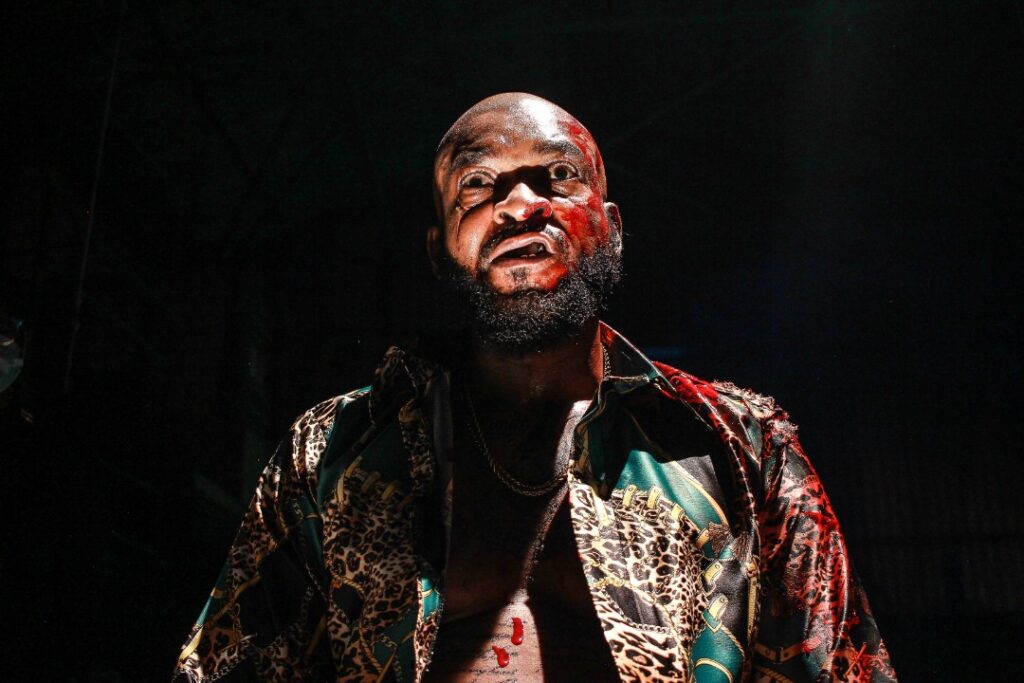
There is a long list of horrible things that Scar does in Shanty Town — extort people, force women into prostitution and getting raped and take their earnings, kill strangers, betray friends, kill people he considers family, sexually assault women, threaten to rape a woman — but it is not these, nor is it the ill-advised lionization of him by the direction, that make him the best character of the year. It is the way that Chidi Mokeme, in a domineering leading turn unlike any other we have seen in Nollywood, plays him up with devouring detail, filling all the gaps of character, making his behaviour provoke ponder: How did this person become like this?
He drags us into Scar’s head by putting all his complexity on display. He uses his body and voice to degrees of exposition, piecing the character together as we watch, making acting choices that are not only surprising but that enhance our understanding of him. Alone in his office, he pulls out a cloth from his crotch and casually sniffs it. It is not merely that he objectifies women; it is the way that he does it. He stares at Shalewa’s ass and says in delight: “Ike e ji ama-atu.” Exemplary ass. It is not merely that he knows when he is outmatched; it is the way that he resents being powerless. When he is beaten by Chief’s bodyguard, he glares at the bodyguard in a way that makes us realize that his resentment is, really, for Chief.
Scar is a shard of broken masculinity, yet this is not to say that there is a psychological deconstruction going on. He does not have the stoicism of Reminisce’s Makanaki in King of Boys or the elocution of Ramsey Nouah’s devilish Richard Williams in Living in Bondage: Breaking Free, but of what use is philosophy when one has mastered animalistic violence? When he butchers one of his women, he caresses her severed head, then uses the blade of the axe to wipe his forehead of blood. His intensity is akin to that of the Old Nollywood villains, and it is why his end registers. It is why he, like those late ‘90s and early ’00s villains, will continue to ring in our collective memory — with or without an AMVCA Best Drama Actor. ♦
To send us screeners, please email editors@opencountrymag.com.
If you love what you just read, please consider making a PayPal donation to enable us to publish more like it.
No One Covers Nollywood Like Open Country Mag
— Cover Story, March 2023: Rita Dominic‘s Visions of Character
— The Epic, Transformative Comeback of Chidi Mokeme
— How Mami Wata Swam to Sundance
— How Dakore Egbuson and Tony Okungbowa Traverse Trauma in YE!
— Writing Omo Ghetto: The Saga, Nollywood’s Highest Grossing Film of All-Time
— How Yahoo+ Captured a Desperate Side of Internet Fraud
— Awaiting Trial: Families of SARS Victims Speak in Devastating Documentary
— Country Love Depicts Tenderness in LGBTQ Lives
Or African Literature
— Cover Story, December 2023: How Leila Aboulela Reclaimed the Heroines of Sudan
— Cover Story, September 2021: Chimamanda Ngozi Adichie Is in a Different Place Now
— Cover Story, July 2021: How Teju Cole Opened a New Path in African Literature
— Cover Story, January 2021: With Novels & Images, Maaza Mengiste Is Reframing Ethiopian History
— Cover Story, December 2020: How Tsitsi Dangarembga, with Her Trilogy of Zimbabwe, Overcame
— Cover Story, April 2022: The Next Generation of African Literature
— Cover Story, February 2022: The Methods of Damon Galgut

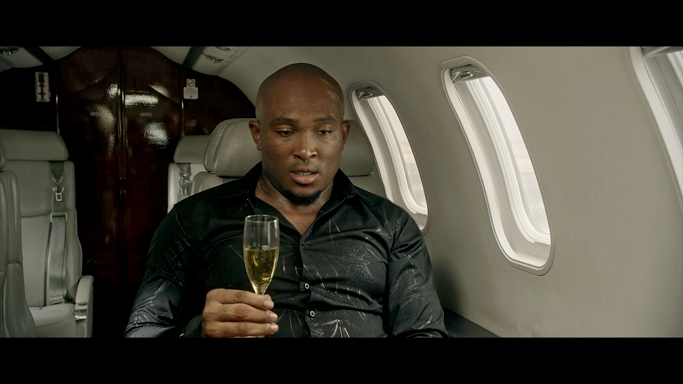
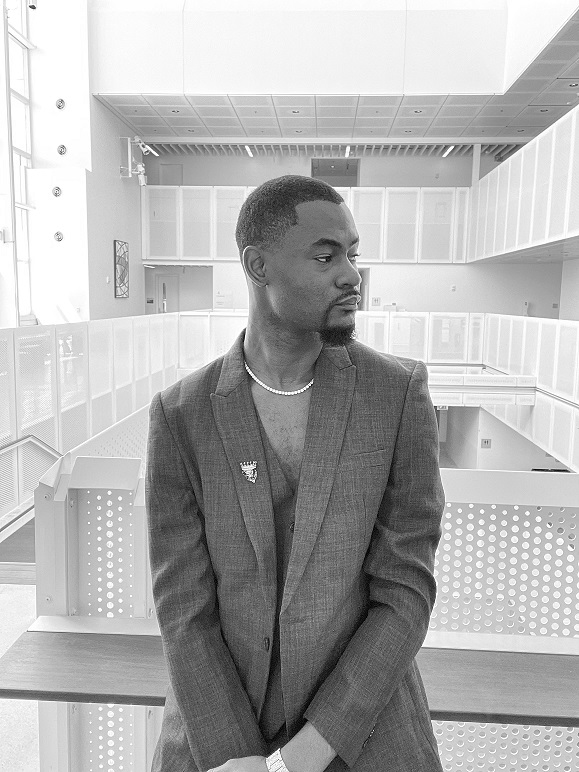
One Response
I’m so glad that Chike is in this light. He is the highlight of last year movie for me, his character Ifeanyi. Chidi Mokeme also is a great cast I enjoyed watching last year. Ah Blossom has always been my favourite. Infact, I totally agree with your list😊